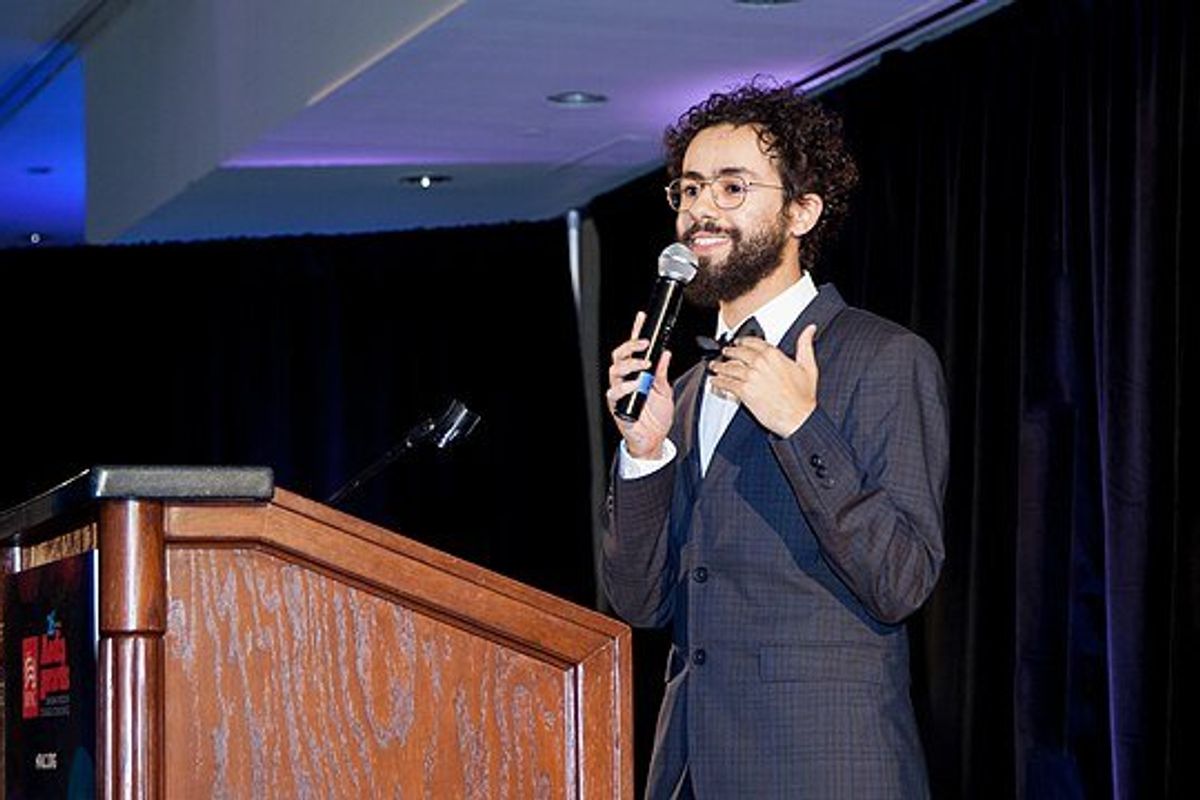Ramy Youssef perfectly walked the tightrope of religion, politics and humor in SNL monologue
Genuine, skillful, heartfelt and funny—a very impressive feat.

Ramy Youssef at the 2017 MPAC Media Awards
Actor and comedian Ramy Youssef pulled off an incredible feat in his March 30, 2024 Saturday Night Live appearance, mixing religion, politics and humor in a way that disarmed and united people. Some people are calling it one of the best SNL monologues ever, and it's genuinely impressive to watch.
How often have you seen someone manage to talk about religion, prayer, the upcoming election, and something like the bombardment of Palestine in a way that isn't offensive, obnoxious, or overwrought and that's also funny? Never, right?
Youssef somehow did all of that in an 8-minute stand-up comedy routine that was equal parts warm, genuine, heartfelt and humorous.
He started off talking about it being a holy weekend, with Ramadan, Easter and Beyoncé's "Cowboy Carter" album dropping. "There's just so many religions celebrating at once," he quipped. "I'm doing the Ramadan one," he added.
Youssef is a Muslim and he shared that one of the things people don't always know about Muslims is how loving they are. After some giggle-worthy examples, he pointed out that there's "all this division, but it's not where you think it is." He spoke about his fear as a Muslim who speaks Arabic in rural upstate New York, yet made it funny. He referenced the Biden campaign in a way that poked fun of identity politics. He celebrated the idea of having a transgender woman president, but what really got people talking was how he ended his monologue.
To wrap it up, he took a more serious—and yet still somehow funny—turn towards prayer for the suffering of the people of Palestine, the hostages in both Palestine and Israel along with his friend's divorce and dog. It's truly a masterclass delivering meaningful commentary with smart, relatable humor.
Watch:
People on YouTube are raving about it.
"Ramy proving you can be irreverent and funny while also spreading love instead of hate," wrote one commenter.
"Ya know.... comedy about religion is touchy.... and he nailed it. Nice work, sir," wrote another.
"Gave me chills. The silence when people realized the depth...and Ramy's generosity in bringing us back with Mr. Bojangles...*perfection*," shared another.
"I have nothing but heart emojis for this man," shared another.
Some people said the monologue brought tears to their eyes. Others remarked at how impressive it was that he covered so many topics that would normally have people gunning for him, but his endearing manner and calm, tactful delivery tempered negative reactions to those topics.
Youssef played a role in the Oscar-nominated "Poor Things" film and had an award-winning special on Hulu, but many SNL watchers still weren't familiar with him. "Don’t know who that guy is, but he performed like standup like a vet. Very impressive. Congrats to him," wrote one person. "No idea who this kid is but I'm impressed.. owning that stage is no small feat. Kid did great," wrote another. (Youssef is 33, so not really a kid by most measurements, but still.)
It's a very narrow line to walk to successfully pull off either religious or political humor, especially in a time of high tensions, so the fact that he nailed both with near flawless balance is really something.
You can follow Ramy Youssef on Instagram.
- Adam Driver gives hilarious impersonation of an 'airplane baby' having a tantrum on 'SNL' ›
- SNL sketch about George Washington's dream for America hailed an 'instant classic' ›
- Scarlett Johansson recreates Katie Britt's historically weird State of the Union speech ›
- Attorney: Louisiana's Ten Commandments law is un-American - Upworthy ›
- SNL's 'Washington's Dream’ skewers the quirks in American English - Upworthy ›
- Relatable 'SNL' skit about calling Dad is making viewers cry - Upworthy ›
- Watch: 'SNL' on what men's doctor visits would be like if they were podcasts - Upworthy ›
- MoonPie renames Florida 'MoonPieTown' just because it can - Upworthy ›
- "How to use a printer" satire perfectly captures our frustration with modern technology - Upworthy ›
- Mom’s viral chats with 7-month-old could be the key to language development - Upworthy ›
- Actress Sierra McClain launches devotional with Mercy Ships and Glorify app - Upworthy ›



 Millennial mom struggles to organize her son's room.Image via Canva/fotostorm
Millennial mom struggles to organize her son's room.Image via Canva/fotostorm Boomer grandparents have a video call with grandkids.Image via Canva/Tima Miroshnichenko
Boomer grandparents have a video call with grandkids.Image via Canva/Tima Miroshnichenko

 Worried mother and children during the Great Depression era. Photo by Dorthea Lange via Library of Congress
Worried mother and children during the Great Depression era. Photo by Dorthea Lange via Library of Congress  A mother reflects with her children during the Great Depression. Photo by Dorthea Lange via Library of Congress
A mother reflects with her children during the Great Depression. Photo by Dorthea Lange via Library of Congress  Families on the move suffered enormous hardships during The Great Depression.Photo by Dorthea Lange via Library of Congress
Families on the move suffered enormous hardships during The Great Depression.Photo by Dorthea Lange via Library of Congress
 Wallace And Gromit Cheese GIF
Wallace And Gromit Cheese GIF 
 Two woman having a heart-to-heart conversation. via
Two woman having a heart-to-heart conversation. via  A man who has dug in his heels. via
A man who has dug in his heels. via